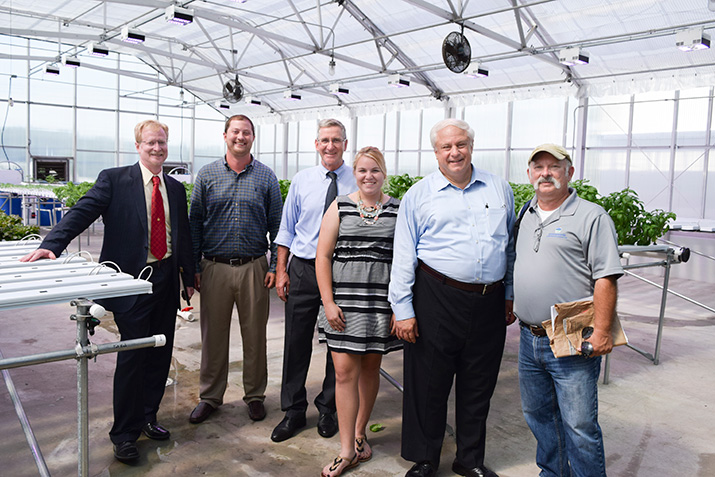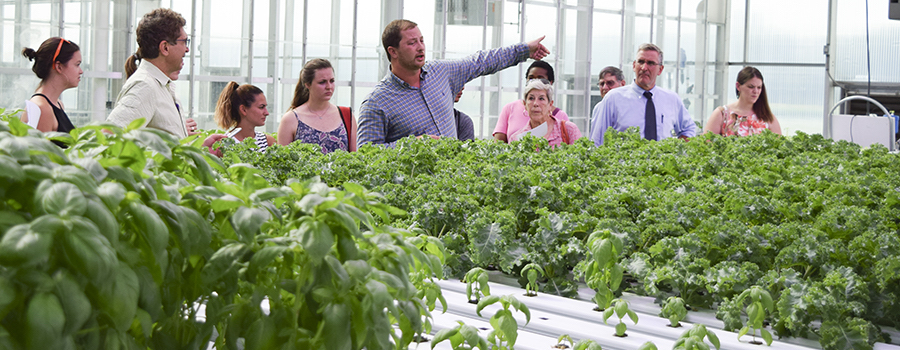Department of Agriculture visits DelVal

Credit: Delaware Valley University. From Left: Delaware Valley University Interim Dean of Agriculture and Environmental Sciences Dr. Chris Tipping, DelVal Hydroponics Greenhouse Manager Chris Filling '15, Pennsylvania Secretary of Agriculture Russell Redding, Hope of the Harvest Communications Coordinator and DelVal media and communications student Kay Woronik '18, Philadelphia City Councilman Al Taubenberger and Pennsylvania Department of Agriculture Special Assistant for Workforce Development Scott Sheely.
Pennsylvania Secretary of Agriculture Russell Redding visited Delaware Valley University on Monday, July 25 to tour the University’s hydroponic greenhouses. Redding served as dean of agriculture and environmental sciences at DelVal from 2011 to 2015. He also taught students in the graduate policy studies program while serving as dean.
“This is exactly how I would want a reception back (to DelVal) to be,” said Redding of the visit. “There’s not a better place to see the diversity of agriculture than at Delaware Valley University…I really appreciate the work that has gone into this school in the past few years.”
Redding and a group from the Pennsylvania Department of Agriculture and its urban agriculture partners in the Philadelphia area are touring facilities in the Commonwealth because of an increased interest in the hydroponics and aquaponics industries in the area.
Redding said he is “amazed every day” by the people who show up in the conversation about food and agriculture and that there is a “real and sincere” interest in where food comes from.
Hydroponic systems allow people to grow food in unconventional places, using less water and without soil. As schools, government officials and businesses look at ways to apply the technology to grow food in cities, there has been a demand for education on urban agriculture. The Pennsylvania Department of Agriculture invited its urban agriculture partners in Philadelphia, Lancaster, and Harrisburg to join it in visiting 10 sites across those locations to learn more about this technology. DelVal was chosen as a stop because the University is investing in research and education in hydroponics and aquaponics.
The group toured the University's Littlefield Hydroponics Institute, which was recently made possible by a $1 million gift from Kate Littlefield. The facility is going to provide new research and hands-on learning opportunities for DelVal students.
Redding said the hydroponics and aquaponics industries offer opportunities to increase the amount of food going to charitable programs, create jobs and produce food within the cities that need it. He wanted the tour to focus on sites that were training the workforce that produces food with this technology, how it can be applied to help the charitable food system provide for those who are less fortunate, and how the technology can be used to create economic opportunities.

Credit: Delaware Valley University. Chris Filling '15, DelVal's hydroponics greenhouse manager, leads a tour of the University's facilities.
Dr. Maria Gallo, DelVal’s new president, said that the industries allow producers greater control over the inputs when growing food. This control allows producers to use less space, less water and fewer resources. Dr. Gallo said that embracing education about the technology and scientific research at the University can lead to solutions to pressing challenges.
About 43 guests attended the event. Councilman Al Taubenberger from Philadelphia City Council attended and spoke briefly about the opportunities the technology could create for Philadelphia. He said the city has a lot of facilities that can be used for vertical farming and that the technology would allow people to enjoy healthy food “close to the source.” He also said embracing urban farming could create job opportunities within the city.
“I’m really excited to be part of this,” said Taubenberger.
Souderton High School also sent a representative. The high school is looking at ways to expand agricultural education partnerships and opportunities for its students.
Dr. Gallo and Dr. Chris Tipping, interim dean of agriculture and environmental sciences hosted the group. Dr. Tipping said local food production within an urban environment addresses many issues.
“Being able to grow large amounts of food within the city is a real game changer,” said Dr. Tipping.
Kay Woronik ’18, a media and communications major who serves as the communications coordinator for DelVal’s Hope of the Harvest charitable garden and Chris Filling ’15, DelVal’s hydroponics greenhouse manager led the tours.